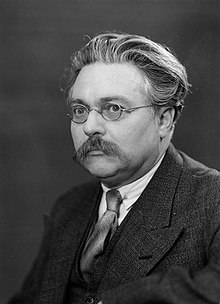Ernest Lafont

Louis-Ernest Lafont (26 July 1879 in Lyon – 7 May 1946 in Paris[1][2]) was a French socialist politician. Lafont represented Loire in the French National Assembly between 1914 and 1928, and then Hautes-Alpes between 1928 and 1936. He served as Minister of Public Health 1935-1936.[1] Politically, he was a disciple of Hubert Lagardelle.[3]
A lawyer by profession from a bourgeois background, Lafont was a graduate of the Ecole des sciences politiques and a lawyer at the Paris Court of Appeals.[2] He obtained a doctorate in Law.[1] He served as the legal attorney of the General Confederation of Labour (CGT).[3]
Inside French Section of the Workers International (SFIO), Lafont belonged to the insurrectionary syndicalist and anti-parliamentary left.[4] In 1910 he contested the parliamentary elections, but trailed behind the winning candidate by merely 500 votes.[1][5] In 1912 he became the mayor of the socialist local government in Firminy.[1][6] In 1914 he was elected to the French parliament from the Le Chambon-Feugerolles constituency, with 11,256 votes.[6] During this period Lafont was able to mobilize sizeable support from the middle class of Firminy, particularly through campaigns against alcoholism and prostitution.[6]
Lafont was re-elected to parliament in 1919, the sole Guesdist deputy from Loire.[6]
Lafont travelled to Petrograd in July 1920, seeking to participate in the second congress of the Communist International.[7] However, he was expelled from Russia on Trotsky's orders.[8] Lafont had been accused of contacts with the Polish Socialist Party.[9] Lafont did however become a member of the French Communist Party in the same year.[8][10] He was expelled from the party in 1923, due to his links to the League for Human Rights.[10]
Lafont joined the Socialist-Communist Union. He was the sole candidate of that party elected in the 1928 French National Assembly election.[11] In the late 1920s, Lafont was one of the more radical profiles in the League for Human Rights, advocating labour rights and pacifism.[10]
Lafont was named Minister of Public Health in the cabinets of Fernand Bouisson and Pierre Laval, formed in 1935.[1][10] Notably, Laval's first employment had been as the secretary of Lafont whilst Lafont had worked as a lawyer for the CGT.[12] Lafont's cabinet tenures lasted between 1 and 7 June 1935 in the Bouisson cabinet, and between 7 June 1935 and 24 January 1936 in Laval's government. His participation in the national government led to him being expelled socialist parliamentary group.[1] In 1936, he lost his parliamentary seat to the SFIO candidate Auguste Muret (the mayor of Gap).[1][6]
He was married to Zinaida Lafont.[9] Lafont died on 7 May 1946 in the Seventh arrondissement of Paris, at the age of 66.[1]
References
[edit]- ^ a b c d e f g h i French National Assembly. Ernest, Louis LAFONT (1879 - 1946)
- ^ a b Gordon, David M. Liberalism and Social Reform: Industrial Growth and Progressiste Politics in France, 1880 - 1914. Westport, Conn. [u.a.]: Greenwood Press, 1996. p. 113
- ^ a b Wohl, Robert. French Communism in the Making, 1914-1924. Stanford, Calif: Stanford University Press, 1966. p. 31
- ^ Wohl, Robert. French Communism in the Making, 1914-1924. Stanford, Calif: Stanford University Press, 1966. p. 14
- ^ Gordon, David M. Liberalism and Social Reform: Industrial Growth and Progressiste Politics in France, 1880 - 1914. Westport, Conn. [u.a.]: Greenwood Press, 1996. p. 106
- ^ a b c d e Gordon, David M. Liberalism and Social Reform: Industrial Growth and Progressiste Politics in France, 1880 - 1914. Westport, Conn. [u.a.]: Greenwood Press, 1996. p. 114
- ^ Wohl, Robert. French Communism in the Making, 1914-1924. Stanford, Calif: Stanford University Press, 1966. p. 180
- ^ a b Wohl, Robert. French Communism in the Making, 1914-1924. Stanford, Calif: Stanford University Press, 1966. p. 184
- ^ a b Friends of Soviet Russia, and Russian Soviet Government Bureau. Soviet Russia Pictorial. Chicago, etc: Friends of Soviet Russia, etc.], 1921. p. 362
- ^ a b c d Irvine, William D. Between Justice and Politics: The Ligue Des Droits De L'homme, 1898-1945. Stanford, Calif: Stanford University Press, 2007. p. 77
- ^ Labour and Socialist International. Kongress-Protokolle der Sozialistischen Arbeiter-Internationale - B. 3.1 Brüssel 1928. Glashütten im Taunus: D. Auvermann, 1974. p. IV. 52
- ^ Torrès, Henry, and Norbert Guterman. Pierre Laval. New York: Oxford university press, 1941. p. 14
- 1879 births
- 1946 deaths
- Politicians from Lyon
- French Section of the Workers' International politicians
- French Communist Party politicians
- Socialist-Communist Union politicians
- Socialist Party of France – Jean Jaurès Union politicians
- Civil service ministers of France
- Members of the 11th Chamber of Deputies of the French Third Republic
- Members of the 12th Chamber of Deputies of the French Third Republic
- Members of the 13th Chamber of Deputies of the French Third Republic
- Members of the 14th Chamber of Deputies of the French Third Republic
- Members of the 15th Chamber of Deputies of the French Third Republic
- Members of Parliament for Loire
- Members of Parliament for Hautes-Alpes
- French general councillors
- Mayors of places in Auvergne-Rhône-Alpes
- 20th-century French lawyers
